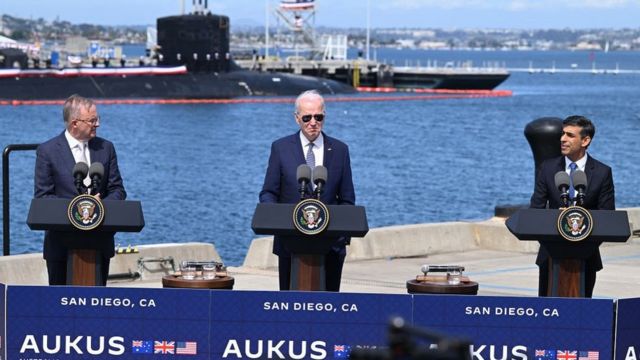
Nazia Sheikh 5 February 2024
By the time 2023 came to an end, the AUKUS Trilateral Security Pact—which unites the US, UK, and Australia—had seen significant developments. The international strategic community was surprised by the unexpected announcement of AUKUS on September 15, 2021. This was done in light of the fact that AUKUS required the US and UK to provide highly demanded nuclear propulsion technology to Australia to help that country build eight nuclear attack submarines (SSNs) with conventional weapons. Considering that the US and the UK last shared such sensitive technology in 1958, this was historic.
AUKUS experienced a number of significant advancements in 2022, the most prominent of which was the establishment of a managing framework for the two separate lines of work: the development of advanced technologies (Pillar II) and the construction of SSNs (Pillar I). This momentum picked up further steam in March 2023 as the three AUKUS chiefs presented a plan for supplying SSNs to Australia. At the AUKUS Defence Ministers Meeting on December 1, 2023, the three countries reaffirmed their commitment to working together to implement this roadmap. But at this meeting, the development of advanced capabilities Pillar II of AUKUS was given more attention.
One of the most intriguing partnerships in recent times is AUKUS, which might be among the most important in the world by 2024.AUKUS can be viewed as the offspring of the Five Eyes, an intelligence-sharing initiative formed by the United States, the United Kingdom, Australia, Canada, and New Zealand after World War II and still going strong today. It brought together three nations that fought together in both world wars and a number of smaller conflicts. Winston Churchill also had this in mind when he penned “A History of the English-Speaking Peoples,” which was a history of nations as much as it was a celebration of the nations that the United Kingdom gave rise to.
The idea that only its members should be trusted with one another’s secrets was implied when the Five Eyes were formed. This is partially due to the strategic interests they all have in common, which are dominating the world’s waters since they are all maritime powers. (After all, the United States’ involvement in World War II as a supplier and ally of Britain was facilitated by the threat posed by German ships.) However, there is another reason for it: the Five Eyes are largely a military alliance, but they also have similar political, economic, and cultural views, and together they account for roughly 30% of global GDP.
Of course, AUKUS has a strategic goal. Initially marketed as a way to assist Australia in obtaining nuclear-powered submarines, it will eventually entail stricter security measures, increased intelligence sharing, local military-industrial capabilities, and the cooperative development of new weapons. Without a doubt, though, its goal is to restrain China’s fleet and keep it from taking control of the Pacific.
However, it is not limited to the Pacific region. Although the Atlantic is not currently under danger, it very well may be in the future, given its pivotal role in both World Wars. Members of AUKUS are aware that the sea will always pose an existential danger to them. All of its members are islands, including the US, which is responsible for defending the surrounding waters. Although the United Kingdom serves as the geopolitical model for AUKUS, having fought in many other theatres of war in addition to economics, technology, and financial markets, the United States has supplanted Britain as the center of gravity in the international system and consequently has to be ready to assist its fellow members.
Since AUKUS was unveiled, global geopolitics have drastically changed in a short amount of time. The conflict in Gaza and the war in Ukraine are two Events that have once again brought attention to Europe and West Asia on a global scale. By giving Israel and Ukraine constant financial and military assistance, the US has been instrumental in these confrontations. Long-term effects on US capacity to provide funding, resources, and political support to AUKUS are inevitable.
AUKUS has made significant progress in two years since its founding, despite the impending uncertainties and difficulties. Tension can occur in any alliance, and AUKUS is not exceptional. However, 2024 will likely see a deeper bond among its members as Canada and New Zealand are expected to join. The impact on the world is immense. Although the alliance is now mostly naval in nature, its economic power cannot be disregarded, particularly given that it is positioned directly against China. AUKUS is, in a sense, the inevitable result of national interests and global culture. Purchasing nuclear-powered aircraft and submarines is only a manifestation of this reality. While there are numerous dimensions to national power, the military is the most visible. As Canada and New Zealand unify their realities, the upcoming year will be dedicated to integrating that power and utilizing it globally.



0 Comments
LEAVE A COMMENT
Your email address will not be published